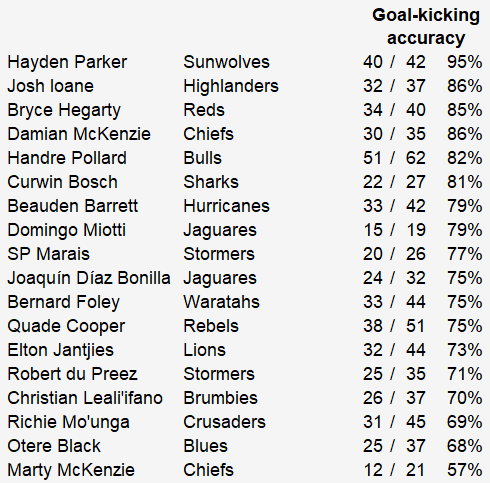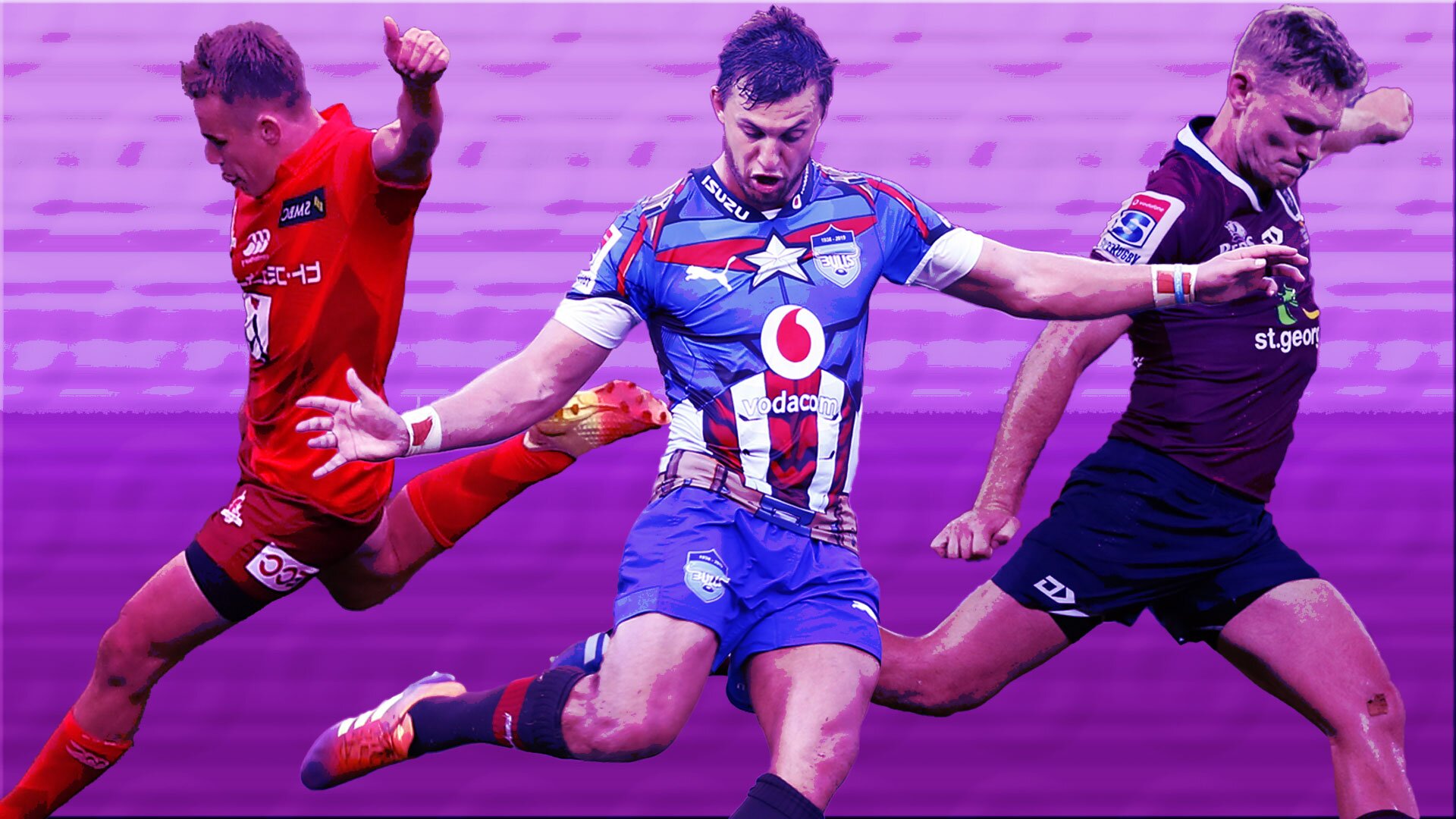Although there may be teams that can buck the tend from time to time, it’s a safe claim to suggest that it’s considerably more difficult to win a game of rugby if your kickers aren’t on form.
Last weekend, Curwin Bosch kicked seven penalties to earn the Sharks an unlikely draw against the Crusaders. The Crusaders may have outscored the Sharks three tries to zero, but Bosch’s accurate kicking kept the Sharks in the game.
Contrast that to the first round of the season where the Chiefs lined up against the Highlanders with no recognised goal-kicker on the field. Between Brad Weber and Shaun Stevenson, the Chiefs only succeeded in two of their five attempts on goal while the Highlander’s Josh Ioane was successful in five of his six attempts. The Highlanders came out trumps in that game, 30 – 27, even though the Chiefs outscored the Highlanders four tries to three.
Goal kicking wins matches, there’s no disputing it. So how have Super Rugby’s goal-kickers been performing in 2019?
Hayden Parker, of the Sunwolves, is once again leading the pack. Parker has missed only twice this season – one conversion and one penalty – which lands him a 95% kick accuracy. The average accuracy for the regular goal-kickers sits at about 77% in 2019, which puts Parker way above the norm.
Next in line are the Kiwi pair of Josh Ioane and Damian McKenzie who are both on 86%. The Highlanders obviously won the kicking duel in round one of the season, with Ioane’s accuracy cementing his team the win. McKenzie was notably absent from that match. The young first-five-cum-fullback has a number of strings to his bow, but his under-appreciated goal-kicking could well have been enough on its own to sway the match in the Chiefs favour.
With McKenzie out for the rest of the season due to a ruptured ACL, the goalkicking duties in the Waikato have fallen to his older brother, Marty (who also missed the match against the Highlanders). Marty’s strike-rate of 57% is the lowest of the current first-choice goal-kickers and could prove problematic for the Chiefs moving forward. Coincidentally or not, the Chiefs are also attempting fewer penalty shots at goals now that the younger McKenzie is out, suggesting that a less favourable game-plan has had to be adopted.
The Red’s Bryce Hegarty is the most accurate goal-kicker in Australia at present with an 85% return rate. Hegarty was scarcely used by the Waratahs in 2018, prompting the transfer to Queensland. This relocation has evidently done Hegarty a world of good and has given him the opportunity for regular game time.
Hegarty’s fellow Australians aren’t performing particularly well on the goal-kicking front this season. Both Incumbent Wallaby first-five Bernard Foley and the man many hope will take that berth, Quade Cooper, are sitting on 75%.
Foley has been known to have bad days off the tee – usually at the least opportune times for Waratahs and Wallabies fans – while Quade Cooper is more known for his creativity on the field than his goal-kicking precision. Less than amazing accuracy in the past has never hampered either player’s selection at the top level and probably won’t have an impact in 2019 either.
South Africa has the fifth and sixth best goal-kickers in 2019’s edition of Super Rugby, in the forms of Handre Pollard and Curwin Bosch.
Pollard’s 82% accuracy has played a significant role in the Bulls’ successes this season, with the Pretorians always comfortable taking any penalty opportunities on offer. With 39 shots to his name, Pollard has attempted more than twice as many penalties as any player in the competition. He is easily the top points scorer this season, sitting on 136. Parker is next best and he’s yet to crack the 100-mark.
Bosch’s usefulness has already been documented, but it’s interesting to note that he was not used as a regular goal-kicker at all last year, only attempting eight shots at goal. Instead, Robert du Preez was the first-choice for the Sharks and he’s only hitting the ball over at a 71% accuracy in 2019.
The Jaguares have utilised both Domingo Miotti and Joaquín Díaz Bonilla at 10 this season since regular first-five Nicolas Sanchez departed at the end of 2018. The younger Miotti has wrestled the jersey off Díaz Bonilla in recent weeks and is kicking at just under 80% – though Díaz Bonilla’s 75% accuracy is not terrible either.
The Crusaders, who are comfortably top of the table, are the one team who have performed to a consistently high standard in all facets of the game except one: goal-kicking. Although it is so often the downfall for a team, goal-kicking has not hindered the Crusader’s march towards Super Rugby supremacy.
Playmaker Richie Mo’unga, who many believe deserves to be starting at first-five for the All Blacks, is the main culprit for the Crusaders’ poor kicking performance. His 69% accuracy is well below what should be expected for a Super Rugby player – let alone an international 10. Last year’s 78% was a considerably better return for the young Cantabrian but is still a little below what you would hope for from your primary goal-kicker.
As a whole, the current crop of goal-kickers are performing slightly worse in 2019 compared to previous years. This season’s kickers who were also operating last year are hitting at 77% this season compared to 81% last year. This difference may be small, but in a competition as close as what’s being served up in 2019, small numbers can make all the difference.











































































